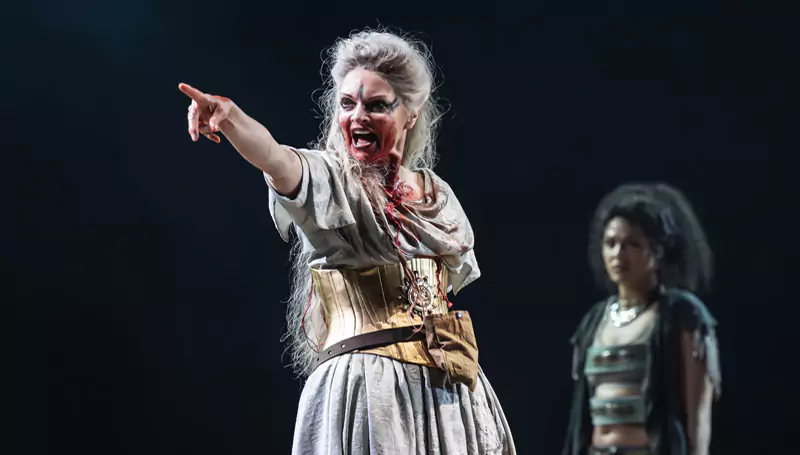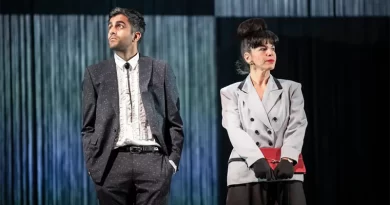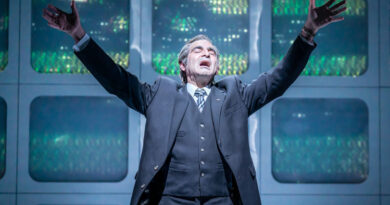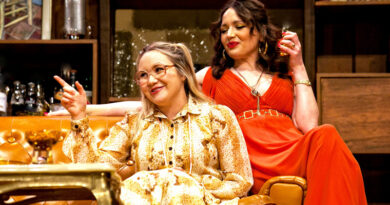“Bacchae” at the Olivier, National Theatre
Jane Edwardes on the South Bank
28 September 2025
★★★☆☆
The National Theatre’s new artistic director Indhu Rubasingham makes a bold start to her reign with her production of Nima Taleghani’s reworking of Euripides’ Bacchae in the Olivier. With her impressive production of The Father and the Assassin in 2022, she showed that this vast stage holds no fears for her. Indeed, it suits her full-blooded style of direction rather better than the Kiln Theatre where she was previously artistic director. And she has chosen to open – for the first time in the Olivier’s history – with a debut play. How’s that for chutzpah?
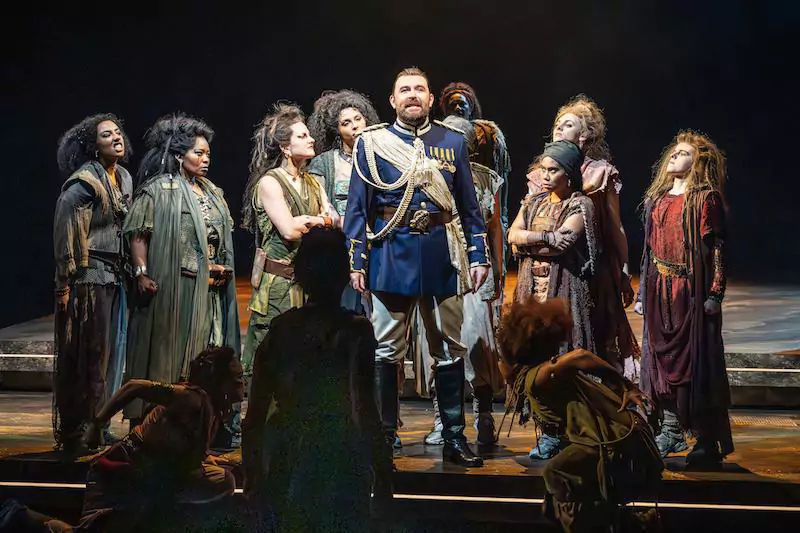
Pentheus (James McArdle) and the Bacchae.
Photo credit: Marc Brenner.
Euripides’ tragedy, written sometime in the fifth century bce, has been transformed by Taleghani (who until now has been best known as an actor in Netflix’s Heartstopper and in Jamie Lloyd’s Cyrano de Bergerac and Romeo and Juliet on stage). Adaptations tend to be free these days, and to be fair, this is billed as a new play after Euripides. There’s nothing wrong with that. Euripides’ great original survives for another day.
The question is whether the new piece works on its own terms and the answer to that is mixed. Taleghani’s play is often comic, with a great love of rhythm and contemporary language, especially filthy language, but it is also sprawling, messy, and occasionally a bit dull. Taleghani has overstuffed the original with contemporary themes, such as feminism and migration, and in doing so has lost the intensity and drive of the original.
Euripides pits the authoritarian, pig-headed Pentheus, King of Thebes, against the irrational and ecstatic. Dionysos (the spelling adopted by the production) arrives with his bacchanalian, frenzied followers seeking revenge for the fact that Pentheus’ mother, Agave, gave him away as a baby, refusing to acknowledge that he was a god. Agave and the other Theban women are lured into the mountains and become part of the frenzied mob where Agave rips her son apart. While the original is set entirely in Pentheus’ palace, Taleghani takes us up into the mountains and shows us events which are better described.
This was apparently Nero’s favourite play, and James McArdle is excellent as Pentheus making him something of a comic despot with shades of both Nero and Donald Trump. He foolishly believes that he can win against a god, even when Dionysos proves that no prison can hold him. In contrast, Ukweli Roach’s Dionysos may be powerful, but here he is also a Peter Pan figure searching for motherly love. Dressed in gold, he scampers and sashays across the stage. He is curiously indecisive for a god, open to suggestions from his female followers.
In a potentially interesting scene, Dionysos and Pentheus begin to bond as they discuss their different childhoods, the poignancy and comedy enhanced by the fact that Pentheus is wearing a dress prior to going to the mountains to spy on the women. But then their abrupt falling out is unconvincing and feels driven by the plot rather than their emotions.
In any modern rendering of an ancient Greek drama, it is tempting to drop the chorus or at least reduce it to a single voice. Here, Rubasingham’s production comes into its own, marshalling a horde of women onstage. In a standout performance, Clare Perkins is Vida the leader, a great, gutsy presence. She warmly embraces every member of the Olivier audience as she makes knowing comments about theatre. The members of her tribe are all individuals: one of them doing research for her erotic fiction; another a conscientious administrator. Hair extensions proliferate, piled high or trailing their backs, and their costumes consist of a patchwork of earthily coloured, flowing materials mostly it would seem made of sacking.
Like the recent staging of Oedipus at the Old Vic, dance is crucial to this production as the chorus shakes and stomps to Kate Prince’s choreography and DJ Walde’s powerful score.
Less effective, is the fact that Taleghani uses the chorus to introduce a theme of migration, suggesting that they are in search of a permanent home. They also become a divided group: some seeking reconciliation and others determined to exact their revenge on men. It leaves Sharon Small’s Agave very exposed as the single representative of the Theban women. Having ripped Pentheus’ messenger apart, she appears spitting blood and carrying a severed limb. The comic excesses of this behaviour detract from her final, terrible realization that she has killed her own son. It puts a great burden on Small that she can’t entirely resolve.
Moving on quickly from Euripides’ tragic ending, this play ends with Dionysos being appointed the god of theatre. Dionysos is the name of the original theatre in Athens, and the production is clearly drawing a link between Greek classical theatre and the theatre of today, celebrating an art form that has survived for so long. The Olivier was indeed inspired by the ancient theatre of Epidaurus.
Rubasingham’s production is full of spectacle, impressively designed by Robert Jones with wonderful lighting by Oliver Fenwick. A great metallic circle fills the stage at the beginning through which a white horse’s head dripping blood emerges. Then, finally, Dionysos disappears into the rafters clutching a rod of light. It’s a raucous affair with some good jokes, but too many modern obsessions have been inserted to make a coherent whole, and, sadly, the ending leaves one cold.

